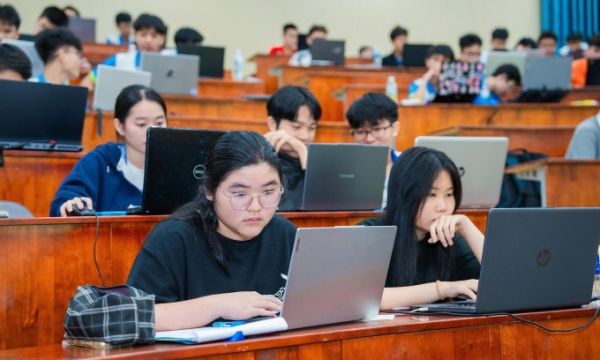
Students in a programming course at the University of Information Technology, Ho Chi Minh City, Vietnam, September 2025. Photo courtesy of the school
Vietnam must train 10 times more AI students to build its tech industry and attract global investors, a tech executive says.
Tran Phuc Hong, deputy general director of TMA Technology Group, said at an Oct. 18 conference on launching a network of training centers for Industry 4.0 technologies, AI and semiconductors that the shortage of skilled workers is holding back Ho Chi Minh City’s ambitions to become a leading AI hub in Southeast Asia.
“AI engineers remain scarce; most are still information technology engineers. Some major corporations have the resources to retrain their workforce, but small and medium enterprises find it difficult,” Hong said.
He noted that HCMC has only about 200 high school students specializing in informatics and around 400 university students majoring in AI, far below what is needed to sustain growth.
“Setting aside quality, the quantity alone is insufficient. Without people, how can we attract enterprises? Other countries are also racing in AI, clients won’t wait for us,” he said.
Hong proposed tripling the number of informatics students and sending top-performing ones abroad for advanced AI training, while universities should increase AI student intake tenfold through expanded admissions and incentives such as halving tuition fees.
He also suggested adding AI modules to information technology programs and retraining recent IT graduates, as well as integrating AI education across engineering fields like electronics and mechanical engineering to spur innovation in multiple industries.
Vietnam currently lacks official data on AI majors. STEM students make up about 28–30% of undergraduates, or roughly 600,000, with a national goal of reaching one million by 2030.
-
Rajasthani sweet that’s winning over Hyderabad: 5 Places to try it

-
Hyderabad: Kite warehouse in Dhoolpet burns down on Deepawali night

-
Sanae Takaichi becomes Japan’s first female Prime Minister

-
The Louvre heist brings Golconda diamonds in the spotlight

-
Diwali gifts gone wrong? Disappointed employees throw Soan Papdi boxes
